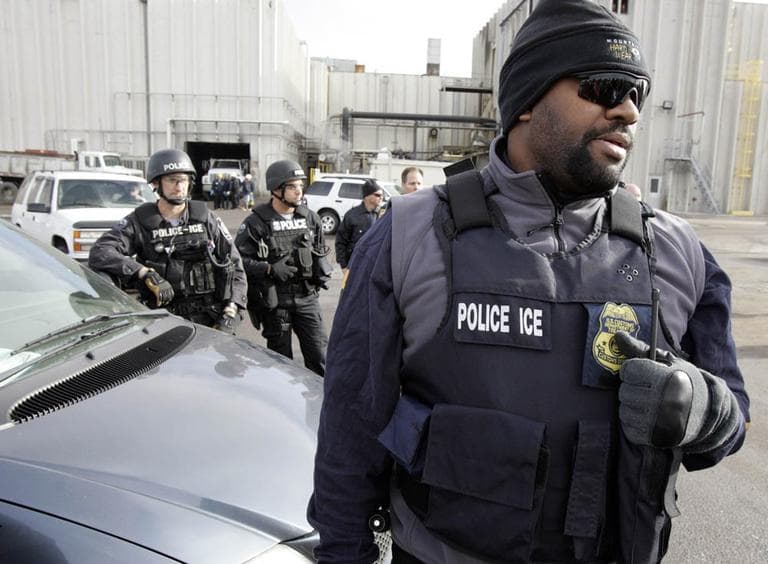Advertisement
Mass. Weighs Pros And Cons Of Controversial Immigration Program
Resume
On Saturday, Massachusetts residents will have their last chance to weigh in on a controversial immigration program. The program, called Secure Communities, sets up local law enforcement agencies to automatically share all arrest information with federal immigration agents.
Some places around the country are backing out of the program, or only enforcing part of the policy. That gives hope to immigrant advocates who hope Massachusetts abandons plans to join.
Officials in Illinois signed up for Secure Communities in 2009.
"Illinois is very interested in removing people convicted of serious crimes who are also in this country illegally," said Brie Callahan, spokeswoman for Gov. Pat Quinn.
Under the program, when the state police arrest someone, the suspect's fingerprints automatically go to Immigration and Customs Enforcement, or ICE. If the prints match immigrants in the ICE database, immigration officials can ask the law enforcement agency to hold them for deportation.
ICE said the program focuses on the "most dangerous and violent offenders." And that's why Illinois signed up, said Callahan, but soon they became disillusioned.
The program sets up local law enforcement agencies to automatically share all arrest information with federal immigration agents. But some immigrants who were never convicted of committing a crime have been deported.
"We felt this was a program that was going to make our community safer, Callahan said. "However, when we have people who are being removed for committing minor crimes, or not having been convicted of any crime, that was not abiding by the terms of the contract and was not making the community safer."
According to her office, more than 30 percent of the people deported from Illinois under the program were never convicted of a crime.
Illinois sent a letter last week terminating its agreement with ICE. That sent shock waves around the country. They weren't the first community to challenge the policy, but this was definitely the boldest move.
"Local law enforcement should not be in the immigration business. That should be the feds' job," said San Francisco Sheriff Michael Hennessey.
Hennessey is also concerned that Secure Communities casts too wide a net.
"You don't want your local community, your minority communities particularly, afraid to talk to the police, afraid to be witnesses, afraid to come forward as victims of crime if they feel that local police is an arm of immigration," he said.
So, Sheriff Hennessey issued a new policy last week.
"We will not honor ICE detainers for minor matters, for misdemeanors or infractions."
The push back in San Francisco and Illinois encourages opponents of the program in Massachusetts.
So far, Secure Communities is only operating in Boston. And the numbers show that more than half of the people deported weren't convicted of any crime: According to statistics from ICE, between November 2008 and March 2011, 330 people were deported under the program in Boston. Of those deported, 176 were never convicted of a crime.
Carol Rose heads the Massachusetts branch of the American Civil Liberties Union. She said local lawmakers are beginning to understand how the program works.
"There's a lot of downside to the program that people didn't anticipate, and there's simply no rush. We would ask that we have a moratorium until we have a better chance to see how this program is operating and has been operating,"Rose said. "There's simply no reason to rush into a decision."
Except that the federal government said the program is mandatory in all states by 2013.
Gov. Deval Patrick said Secure Communities will be in Massachusetts. But that's after he took fire during his election for not signing up.
After the election, however, he said the state would join early this year because it is required to. That didn't happen. Instead, his administration set up a series of town hall meetings to hear concerns before implementing the program. The last hearing is Saturday in Brockton.
Supporters of Secure Communities say the governor is stalling.
"The governor really has been taking too long to come to a decision on this and gives the impression that he doesn't want to go forward," said Jessica Vaughan, a Boston-based analyst for the Center for Immigration Studies, a Washington, D.C., think tank that favors stricter immigration enforcement.
"That is truly unfortunate, not only for the people who want to see our immigration laws enforced, but for the people who have to live in the communities with the people committing the crimes."
State officials say they are watching the developments around the country. But for now, they still plan to implement the program sometime after the summer.
This program aired on May 13, 2011.